PORT MORESBY – Pope Francis on Sunday told Catholics in Papua New Guinea to have hope and to stay close to God amid their daily challenges, and not to close themselves off from Christ or others when things become difficult.
Speaking at Port Moresby’s Sir John Guise Stadium Sept. 8, the pope told Catholics there and in an overflow stadium nearby that Jesus “encourages his people and, even amid difficulties and suffering, invites them to raise their eyes to a horizon of hope and to a future where God is coming to save us.”
“This prophecy is fulfilled in Jesus. He is the Messiah whom the Father sent so that the downhearted might find courage, sinners be forgiven, the blind gain sight, and the deaf finally hear,” he said.
Pope Francis celebrated Mass on his second full day in Papua New Guinea, having met national authorities and the country’s bishops, clergy and religious the day before, calling for attention to the peripheries, for development, an end to crime, and the protection and promotion of women.
RELATED: Pope urges development, end to crime and protection of women in Papua New Guinea
Starting Mass a full 45 minutes ahead of schedule, the pope focused his homily Sunday on the day’s Gospel reading from Matthew, in which Jesus heals a man who is deaf and mute.
The Gospel passage, the pope said, illustrates both the distance of the deaf man – who was from Decapolis, an area far from the religious center of Jordan and, as a place inhabited largely by pagans, considered impure – and the closeness of Jesus, who came to heal him.
Pope Francis said the man was also distant in another way, since as a someone who was deaf and unable to speak, he was “cut off from the world, isolated, a prisoner of his deaf and mute condition, so he cannot reach others or communicate with them.”
This scenario is also applicable to modern realities, the pope said, saying, “we too can become cut off from communion and friendship with God and with our brothers and sisters when, instead of our ears and tongue, our hearts become blocked.”
“Indeed, there is a kind of inner deafness and muteness of heart that occurs whenever we close in on ourselves, or shut ourselves off from God and others through selfishness, indifference, fear of taking risks or putting ourselves on the line, resentment, hatred, and the list could go on,” he said.
All of these things distance a person from God and from others, and they rob life it its joy, he said, but insisted that whatever the distance might be, Jesus is always near.
It is through Jesus, he said, that God “wishes to show us first of all that he is near and compassionate, that he cares for us and overcomes any distance.”
Francis noted that Jesus consistently ventured to territories on the peripheries, and in doing so, he brought those considered to be distant closer, and made himself familiar to those who were considered strangers.
He told faithful that whenever they feel distant or choose to keep themselves far away from God and from those who are different from themselves, “we close ourselves off, barricading ourselves from the outside.”
“We end up, then, revolving only around our own ego, deaf to the word of God and to the cry of our neighbor, and therefore unable to speak to God or our neighbor,” he said.
Yet Jesus demands that every person be open, the pope said, saying God “conquers our hardness of heart, helping us to overcome our fears, to open our ears and loosen our tongues; in this way, we rediscover ourselves as children loved by God and as brothers and sisters of one another.”
Pope Francis said that being on an island in the Pacific Ocean might at times make them feel far away and distant from the rest of the world, while there might also be other personal reasons people feel distant from God.
Regardless of whatever causes the distance, Jesus, he said, “wants to draw near to you, to break down distances, to let you know that you are at the center of his heart and that each one of you is important to him. He wants to heal your deafness and muteness.”
He closed his homily telling faithful not to be afraid and to open themselves up to the Gospel and to an encounter with God and with others, saying, “May none of us remain deaf or mute before this invitation.”
After Mass, the pope led attendees in praying the Angelus, asking Mary to intercede for the people of Papua New Guinea and the Solomon Islands, praying specifically that she would “strengthen the unity of families, make young people’s dreams beautiful and courageous, support and console the elderly, comfort the sick and the suffering!”
He prayed for peace throughout Asia, Oceania and the Pacific and for respect of the natural environment, saying, “No to rearmament and exploitation of our common home! Yes to the encounter between peoples and cultures, yes to the harmony of men and women with creatures!”
After Mass, Pope Francis traveled to the remote Diocese of Vanimo, where he was scheduled to meet with local faithful and hold a private meeting with missionaries in the area, several of whom are Argentinian.
Cardinal John Ribat of Port Moresby at the end of Mass thanked Pope Francis for his visit, saying his presence “brings us blessings, peace and encouragement and deepens our faith.”
“We are very grateful for the Eucharistic celebration that we just celebrated with you. It unites us with the Church of Rome,” he said, and asked that God “continue to bless you abundantly, especially with good health, as you continue to carry out your ministry.”
Follow Elise Ann Allen on X: @eliseannallen














